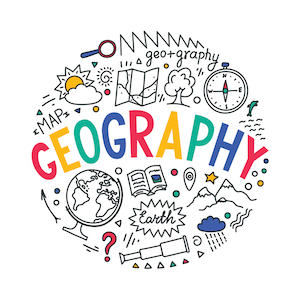"Geography explains the past, illuminates the present and prepares us for the future. What could be more important than that?" - Michael Palin
Geography
Through the study of Geography at Cranborne, our students develop a curiosity for the world around them and compassion for those we share it with.
Our lessons equip pupils with knowledge about diverse places, people, resources and natural and human environments, together with a deep understanding of the Earth’s key physical and human processes. As pupils progress, their growing knowledge about the world helps them to deepen their understanding of the interaction between physical and human processes and of the formation and use of landscapes and environments in the context of our rapidly changing world.
We aim to enable our children to better understand how we are connected to the world around us. The ultimate goal is to help students to think more intelligently about complicated and unresolved issues such as global warming, international population movements, food security and where to build new homes. The subject is concerned with real world learning and making sense of the world first hand, or 'in the field'.
The teaching of Geography in Cranborne:
In ensuring high standards of teaching and learning in Geography, we teach a curriculum that is progressive throughout the whole school. Geography is taught as part of a half termly topic, focusing on knowledge and skills stated in the National Curriculum. Although we make meaningful links to other curriculum areas, we believe that children should see geography as a subject in its own right. When planning our curriculum, we have thought about its distinctive character as a discipline and ensured that we have woven the concepts that are fundamental to geographical thinking into our curriculum. Skills needed to be a geographer are taught progressively. Concepts are built upon, learning is revisited and children’s locational knowledge is built on year on year.
What knowledge and skills do we teach?
- Physical geography, including: climate zones, biomes, vegetation belts, rivers, mountains, volcanoes, earthquakes and the water cycle
- Human geography, including: settlements and land use and the distribution of natural resources
- Our local area and how to care for it
- The position and significance of latitude, longitude, Equator, Northern Hemisphere, Southern Hemisphere, the Tropics of Cancer and Capricorn, Arctic and Antarctic Circle, the Prime/Greenwich Meridian and time zones
- How to use and interpret maps, photographs, globes, atlases and computer mapping
- How to use the 8 points of a compass.
- How to conduct fieldwork to observe, measure, record and present the human and physical features in their local environment
All this and much, much more!

What is in our local area?

The Four Components of the Geography Curriculum are:
- Locational Knowledge
- Place Knowledge
- Human and Physical Geography
- Fieldwork and Geographical Skills
At Cranborne, Geography is mostly taught through topics and is often linked with other subjects such as English, History and R.E. This cross-curricular approach enables children to build connections and deepen their understanding.
For more information on Primary Geography please click on the link below:
The Seven Continents song
Listen to us sing our song here! They learnt about each continent and learnt to locate them on a map.
Can you name and locate the seven continents?

Useful websites
BBC Bitesize Geography
https://www.bbc.co.uk/bitesize/subjects/zbkw2hv
National Geographic Kids
https://www.natgeokids.com/uk/teacher-category/geography/
Topmarks (Geo) Great for interactive maps
https://www.topmarks.co.uk/interactive.aspx?cat=98
Geography for Kids
https://www.kids-world-travel-guide.com/geography-for-kids.html
Continents quiztime!
https://online.seterra.com/en/vgp/3004
Capital city quiztime!
https://www.ducksters.com/games/europe_capital_cities_map_game.php
https://www.funkidslive.com/quiz/know-names-capital-cities/
Flags quiztime!
https://www.funkidslive.com/quiz/can-guess-flags-countries-world/

